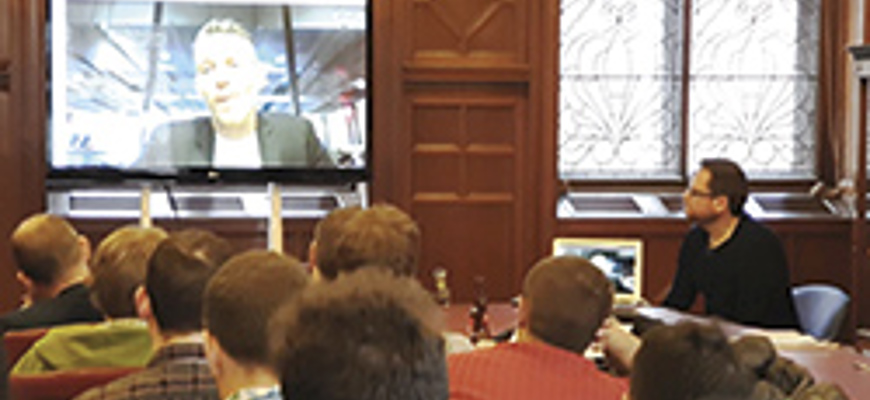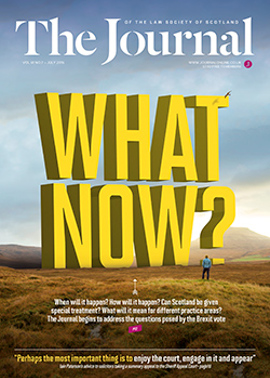Hacking into the law

The legal and technology sectors joined forces last month for Scotland’s first justice-themed “hackathon”, Tech 4 Justice.
Organised by the Law Society of Scotland and Legal Hackers Scotland, the 48-hour event was conceived to generate innovative ideas and technical solutions aimed at addressing access to justice issues.
A total of eight teams comprising participants from the tech, legal, business and creative communities took part over the weekend of 17-19 June in Glasgow’s Rookie Oven, a co-working space for startups. Ideas ranged across apps to provide on-the-spot legal information, help to demystify the legal system and decipher “legalese”, and help those with small claims cases. Developed into working models during the session, the results were judged by a panel comprising Morna Simpson of Girl Geek Scotland, Gavin Neate of Neate Box Ltd, and Callum Sinclair, partner and head of technology at Burness Paull.
Top ideas
Team Swift – Marie-Clare Harold, Andrew McKenna and Gabriele Tornetta – took top honours for their idea of Gavin the Gavel, an online system to help with small claims, including filling out forms and predicting likely outcomes of cases. They were awarded £2,000 for their proposal, which was described by the judges as an extremely ambitious idea which focused on the end user.
Runners-up were Team Unstoppable – Meadhbh Murphy, Bartek Juszczak, Ian Denev and Iain Mathieson – who won £1,000 for their app and website, featuring a heat map, to provide information, record conversations and tackle problems related to stop and search.
Third prize of HackTrain 3.0 tickets was awarded to Team Chatomate – Srini Janarthanam and Diwakar Thakore – for their chatbot “Julie”, also designed to guide people with small claims cases, from answering questions on paperwork to letting them know what to expect in court, and praised as “very slick” by the judges.
Invited speakers also attended, in person or by video link – Martin Jones, head of law at Glasgow Caledonian University; Dennis Mortensen, of x.ai (by video link from New York); Scott Seivwright, digital transformation lead and Agile coach; Peter Carayiannis, of Deloitte Conduit Law LLP (by video link from Toronto); Joya van Hout, legal service designer of Kennedy Van der Laan, Amsterdam; and Monica Ugalde Del Rosal, entrepreneur and coach.
Collaborative success
Stuart Naismith, convener of the Society’s Access to Justice Committee, commented: “The event was a great success and there was enormous enthusiasm from the teams who worked on creating solutions which would help improve access to justice using technological solutions. There was particularly strong participation from the technological sector and I’d certainly encourage more solicitors and others from the legal sector to get involved in any similar event.
“It was very impressive to see just how the teams turned their ideas into credible pitches in just two days and I think there is real opportunity in working with technicians, developers and designers to deliver new legal products to the legal marketplace.
“The essence of Tech 4 Justice hackathon was the collaborative process, and I am convinced that we as lawyers would benefit hugely from such collaboration in the future.”
Arlene McDaid, founder of Legal Hackers Scotland, added: “This was a unique and important event. In 48 hours the teams developed access-to-justice solutions that could be deployed in a relatively short timescale with a modest level of investment. Access to justice is a fundamental right and the innovations developed at the hackathon have the potential positively to impact the lives of citizens in Scotland and beyond.
“Legal Hackers is a global movement of lawyers, policymakers, technologists and academics who explore and develop creative solutions to some of the most pressing issues at the intersection of law and technology. The rise in technology-enabled legal solutions will continue and I encourage the legal community to join the conversation.
“The Legal Hackers Scotland meet-up is a forum for legal professionals to engage and collaborate with the tech community. Future meet-ups will explore topics such as AI, drones, the sharing economy, autonomous vehicles, big data, legal innovation and more. It’s free to get involved.” (legalhackers.org)
In this issue
- Environmental law outside the EU
- 2014 revisited: championing Scotland in the EU
- “Justice for sale”
- After the fling
- Traps for the unwary
- Reading for pleasure
- Opinion: Rory Scothorne
- Book reviews
- Profile
- President's column
- Leading by example
- People on the move
- Brexit: a full menu
- Appeal of the new court
- Hostility enacted
- Socially motivated
- Back on the case?
- Send the client in?
- What does Brexit mean for planning and environmental law?
- Immigration meets licensing: not a marriage made in heaven
- Post-Brexit taxation: less of a certainty?
- Scottish Solicitors' Discipline Tribunal
- Community right and commercial sale
- Plane language
- Law reform roundup
- SSDT has a new clerk
- Covered by the terms?
- Ask Ash
- To boldly go...
- Hacking into the law
- Paralegal pointers






